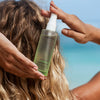First things first – all skin types are completely natural. Yours is an innate part of you that won’t suddenly change overnight, and it shouldn’t. That being said, we know that sometimes life in our bodies isn’t always going to be perfect. While our skin types stay the same, our skin’s day-to-day can be full of unpredictable moments or recurring patterns we don’t love, whether it’s the weather or a change in environment that’s having an impact. That’s what our Skincare School series is here for; to give you the tools to understand your skin type, what’s affecting it, and how to help it to look and feel its very best.
On the agenda today? Sensitive skin! This skin type has a lot of feelings and would very much like to talk about what’s been irritating it lately, so without further ado, let’s give it the floor...
So, what exactly is sensitive skin?
With the bounty of different formulations out there, it can be easy to take for granted the veritable smorgasbord of selections many of us can easily fill our daily routines with. If you have sensitive skin however, navigating your way through this maze of products to find ones that agree with you can feel more like you’re working as a full-time beauty detective.
Sensitive complexions are ones that develop a reaction when exposed to particular ingredients. Those reactions can be just as dynamic as the triggers that set them off, but commonly include –
- Areas of red inflammation
- Flaky, dry patches on the skin
- Acne breakouts
- A stinging sensation (which may or not be accompanied by redness)
Although our advice is tailored towards mild cases of sensitivity, it can also be a larger symptom of skin conditions like eczema or dermatitis. If symptoms are frequently experienced and/or moderate to severe, then always consult with a doctor or dermatologist for professional advice.
What can have an impact on sensitive skin?

It all starts with our protective moisture barrier – tale as old as time when it comes to skincare. This layer of lipids (natural fats) and oils sits at the top of our epidermis to keep pollution and bacteria out and much-needed moisture in where it can keep our skin soft, supple and healthy. In sensitive skin, the reaction your body has to your skincare ingredients damages your barrier function, making it much easier for moisture to be lost and bacteria to get into the skin’s top layers.
Although there’s no high-tech sci-fi machine we can use to automatically predict which ingredients will affect your complexion specifically, there are some recurring characters which pop up time and again in cases of skin sensitivity that you should automatically give a permanent spot on your no-fly list. We all love a moment of sensorial bliss, but products containing fragrance (whether synthetic or natural) are to be kept at a minimum if your skin is reactive, as is alcohol due to its extreme drying effects. Oh also, when we say alcohol, we mean toners and cleansers using compounds like methanol and isopropyl alcohol, we’re assuming none of you have ever plunged your face into a sink full of vodka…
You’ve probably long since sworn off using shampoo formulated with sulfates after hearing that they get a little too eager about stripping any natural oils they come across. What’s definitely flown more under the radar is that for sensitive skin, they can also be a big no-no and cause inflammation.
One last thing to add to the list; comedogenic products. These stand in the way of your moisture barrier doing its job by clogging pores and eventually causing skin to break out. Ingredients to keep an eye out for? Isopropyl isostearate and acetylated lanolin are some of the main comedogenic culprits.
How do I take care of sensitive skin?
- This is the part where you turn detective! When you’re repeatedly having a reaction to the same product, make a note of all the ingredients and scrub it out of your routine. If skin is still being reactive to other products, check to see where the formulations match up and you’ll start to get an idea of which ingredients aren’t agreeing with you.
- Every time you introduce new skincare to your routine – even if it doesn’t contain any of the ingredients you react to – apply a small amount to an area of skin that isn’t normally visible, like the crook of your elbow. This gives you the chance to put it to the test and see if you experience a flareup without exposing your face to it. If it passes, great news! You’ve got one more go-to in your beauty lineup.
- Give your moisture barrier the best chance to protect you against sensitivity by fully nourishing it with a cleanser and natural moisturiser duo twice a day. Your cleanser should be a super-gentle, creamy formula that helps to melt away excess oil without stripping your skin of the sebum it needs for a healthy glow. When it comes to finding the right moisturiser, narrow your search by looking for a fast-absorbing, lightly formulated option high in peptides, ceramides and fatty acids that will put in the hard work of strengthening the moisture barrier.
- Lovers of the power shower, prepare to celebrate. As hot water aggravates sensitive skin that’s already inflamed, it’s best that you keep your time under those warm jets to 5 minutes max (you can have 10 if you’re going for a full soak in the tub). Once you get out, pat yourself down gently rather than vigorously rubbing and aim to moisturise from top-to-toe within a minute of drying off so you can bring your moisture levels back to balance.
Which ingredients are good for sensitive skin?

Look out for skincare which features..
Aloe vera – It’s probably no surprise to see this soothe operator make the cut! Renowned for its hydrating ability, it calms agitated, itchy areas with its cooling, nourishing touch.
Bakuchiol – Retinol is all the rage, with its collagen-boosting properties the stuff of skincare legend. For those with sensitive skin, however, it can be extremely irritating. That’s where this plant-based bio alternative comes into play, delivering the same even-toned results without any peeling or redness.
Tamanu oil – When an ingredient’s nickname is ‘green gold’, you know you’re talking about something special. Hailing from French Polynesia, this super soother quickly puts aggravation and inflammation at ease. Think of it as a calming caress for areas of sensitivity.
The sensitive skin FAQ
Should I exfoliate sensitive skin? Our answer to the exfoliation question is always yes, yes, a thousand times yes! Buffing away dead skin cells is a vital part of your routine to make sure the rest of your products are able to penetrate deeper and work their magic on the freshest, smoothest skin possible.
When your skin reacts sensitively at the best of times however, it’s important to ensure you’re taking certain precautions in your choice of exfoliator. Avoid grainy, mechanical scrubs or exfoliating brushes that distress skin by tugging on it, instead opting for a mild chemical exfoliator formulated with polyhydroxy acids (PHAs). These are gentler than the commonly used alpha hydroxy and beta hydroxy acids (AHAs and BHAs).
How should I shave sensitive skin? Start by running warm water over the area you’re shaving for 30 seconds to soften any coarse hairs without having to expose irritated skin to a full shower. Then use your exfoliator to remove any layers of dead skin which may blunt your razor.
When you’re ready to start, reach for an SLS-free shaving gel. SLS is a harsh foaming sulfate present in shaving foams, which are often high in fragrance and alcohol. A gel is naturally thinner in consistency and lubricates the skin more effectively, allowing a razor to glide over it with minimal aggravation.
Once you start to shave, carefully move in the direction of hair growth to avoid any in-grown hairs that may cause painful inflammation. If you notice that you need to shave one area of skin further, leave it for a few minutes and then go back to it, as repeatedly going over the same patch will only distress it.
Nearly done! Dry off skin once you’re finished with soft pats before locking in hydration with your moisturiser.

 Skincare
Skincare
 Gifts
Gifts

 Bestsellers
Bestsellers
 Makeup
Makeup
 Body Care
Body Care
 Men's
Men's
 Hair Care
Hair Care
 Mama & Baby
Mama & Baby


